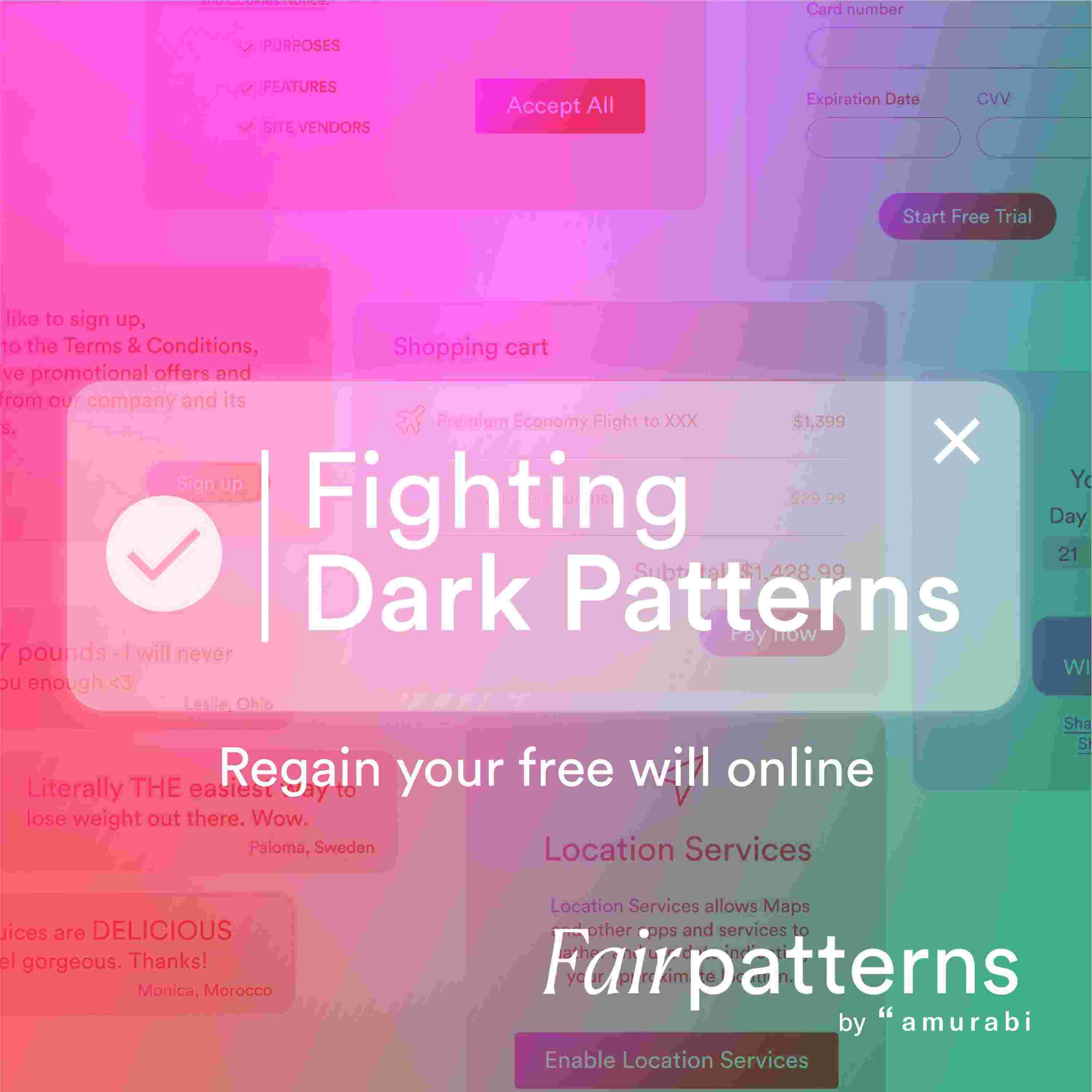
Have you ever struggled to resist sites or apps which prompt you to share ever more personal data? Who hasn’t casually clicked on the big green “I agree” button, instead of the little grey links below? And who doesn’t lose their patience unsubscribing from a website, when all it took was one click to “try for free”?
These features are called “dark patterns” or “deceptive patterns”, which are interfaces that deceive or manipulate users to make them act without realizing or against their own interests.
Why should we care about it ? Because …
✅ dark patterns harm the autonomy, the welfare and the privacy of individuals, and are psychologically detrimental
✅ a number of laws already prohibit dark patterns, and the global legislative framework is shifting towards clarity, transparency, accessibility and fairness by design
✅ dark patterns affect competition and trust in brands, and even puts our democratic models at risk
And because eventually, there is nothing sustainable about tricking users.
Dark patterns are pretty much everywhere online and yet, it’s not inevitable to be deceived or manipulated. With this podcast, once a month, Marie Potel, founder of the legal design agency Amurabi and of the platform fairpattern.com explore with her guests all the aspects of this dark and broad matter : regulation, ethics, marketing, user experience and much more.
A question or a need for support ? Go on fairpatterns.com or contact Marie Potel on LinkedIn !
This podcast is proposed and presented by Marie Potel, produced by Amicus Radio and directed by Leobardo Arango.
Original Music : Alexis Mallet.
Hébergé par Acast. Visitez acast.com/privacy pour plus d'informations.
Have you ever struggled to resist sites or apps which prompt you to share ever more personal data? Who hasn’t casually clicked on the big green “I agree” button, instead of the little grey links below? And who doesn’t lose their patience unsubscribing from a website, when all it took was one click to “try for free”?
These features are called “dark patterns” or “deceptive patterns”, which are interfaces that deceive or manipulate users to make them act without realizing or against their own interests.
Why should we care about it ? Because …
✅ dark patterns harm the autonomy, the welfare and the privacy of individuals, and are psychologically detrimental
✅ a number of laws already prohibit dark patterns, and the global legislative framework is shifting towards clarity, transparency, accessibility and fairness by design
✅ dark patterns affect competition and trust in brands, and even puts our democratic models at risk
And because eventually, there is nothing sustainable about tricking users.
Dark patterns are pretty much everywhere online and yet, it’s not inevitable to be deceived or manipulated. With this podcast, once a month, Marie Potel, founder of the legal design agency Amurabi and of the platform fairpattern.com explore with her guests all the aspects of this dark and broad matter : regulation, ethics, marketing, user experience and much more.
A question or a need for support ? Go on fairpatterns.com or contact Marie Potel on LinkedIn !
This podcast is proposed and presented by Marie Potel, produced by Amicus Radio and directed by Leobardo Arango.
Original Music : Alexis Mallet.
Hébergé par Acast. Visitez acast.com/privacy pour plus d'informations.

In early 2023, the European Commission and national consumer protection authorities (the “CPC network”) screened 399 online shops. They only focused on 3 specific types of dark patterns: fake countdown timers; interfaces designed to lead consumers to purchases or subscriptions; and hidden information. Even on such a narrow basis, their investigation showed that 148 sites contained at least one of these three dark patterns. The Dutch Authority for Consumers and Markets (ACM) also conducted a sweep in 2023, during which they automatically detected a specific type of dark pattern: countdown timers. Results showed dozens of infringements, just on this one type of deceptive design.
In today’s episod, Marie Potel speaks with Dries Cuijpers, Senior Enforcement Official and coordinator of the Digital Economy at the Consumer Division of the Netherlands Authority for Consumers and Markets. Dries has 20 years of experience as an enforcement official in numerous economic sectors. He set up ACM’s Behavioural Insights Team and managed the team for the first 5 years, he has worked for the OECD on consumer policy and he is a co-author of ACM’s Guidelines on the Protection of the Online Consumer.
What type of harms are caused by dark patterns, from a regulator point of view? How is the Dutch authority tackling this issue? What’s the future of regulation on deception and manipulation around the world? Let’s talk about it here and now!
To go further :
Have a question or need some support? Visit us at fairpatterns.com and follow us on LinkedIn: FairPatterns!
Hébergé par Acast. Visitez acast.com/privacy pour plus d'informations.